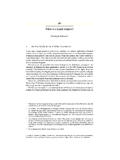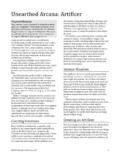Transcription of 191 Aspects of Radical Constructivism
1 Ernst von Glasersfeld (1996) Aspects of Radical Constructivism 1 Published as: Aspectos del constructivismo Radical ( Aspects of Radical Constructivism ), in (ed.), Construcciones de la experiencia humana (23 49). Barcelona, Spain: Gedisa Editorial, 1996. 191 Aspects of Radical Constructivism * The main difference between science and religion, we were told in school, is that religion is founded on a dogma that is absolute and immutable because it stems from divine revelation, whereas science is tentative because it develops theories that are always open to refutation by new findings or novel experiments. Scientists, therefore, are supposed to be open-minded and to welcome the solution of stubborn problems, even if the new solutions entail a change of thinking and the demise of concepts that seemed well established in the past. A look at the history of scientific ideas, quickly shows that scientists do not always live up to this ideal open-mindedness. The concepts and methods they grew up with frequently seem to be as unshakable as any matter of religious faith, and the perpetrators of innovation tend to be treated as heretics.
2 This happened to Darwin and his theory of evolution, to Einstein when he first published the theory of relativity, and it happened to Alfred Wegener when he suggested the idea of continental drift. In these spectacular instances the break with tradition advocated by the new theory was unmistakable and, consequently, triggered violent indignation on the part of those who were anxious to maintain the familiar established dogma. The new theories won out eventually, because they enabled scientists to do things they had not been able to do before and to cover a larger area of experience with fewer assumptions. In philosophy, the pattern has been different, especially with regard to the problems of epistemology, , those concerning knowledge, its origin, and its truth . These problems remained unchanged and unsolved, and they have troubled Western philosophy for more than 2500 years. It is an historical fact that some of the pre-Socratics, the philosophers who wrote before Plato s reports of the Socratic dialogues, had already seen the basic epistemological crux.
3 Its source can be found in two presuppositions that have always seemed natural and inevitable: a) that a fully structured world exists independently of any experiencing or knowing human subject; * This text contains revised segments of three earlier publications: Cognition, construction of knowledge, and teaching, 1989, Synthese, 80,121 140; The reluctance to change a way of thinking, 1988, The Irish Journal of Psychology, 9, 83 90; Environment and communication, in & (Eds.), Transforming children s mathematics education, 30 38. Hillsdale, : Lawrence Erlbaum, 1990. Ernst von Glasersfeld (1996) Aspects of Radical Constructivism 2 b) that the human subject has the task of finding out what that real world and its structure are like. These assumptions inevitably lead to a paradox. Whatever a human subject perceives or conceives is necessarily the result of that human subject s ways and means of perceiving and conceiving.
4 There is no way of comparing the results of these activities with what might exist independently, because the only access to the presumed reality would be through yet another act of perceiving and conceiving. Throughout the Western history of ideas, the sceptics have not ceased to reiterate this irrefutable logical argument, but it has not deterred philosophers from trying to find a way around the impasse. Michel de Montaigne is often listed among the sceptics, but this is a little misleading. He actually used his outstanding wit and erudition to defend the realm of religious faith against the threat of the Pyrrhoniens, a group of 16th-century thinkers in France, who had rediscovered Sextus Empiricus and his account of Pyrrho, the father of scepticism in the Hellenic world. Montaigne merely cut down to size the efforts of human reason in order to safeguard the power of faith. He put it as concisely as one can: La peste de l homme, c est l opinion de The translation that to me seems the most adequate, would be: Mankind s plague is the conceit of knowing.
5 Principles of Constructivism Radical Constructivism is an effort to eliminate that conceit. It does not deny the possibility of knowing, but it strives to show that knowledge is not the commodity the tradition of Western philosophy would have us believe. Indeed, Constructivism is a theory of active knowing, not a conventional epistemology that treats knowledge as an embodiment of Truth that reflects the world in itself , independent of the knower. The two basic principles of Radical Constructivism are: 1) Knowledge is not passively received either through the senses or by way of communication, but it is actively built up by the cognizing subject. 2) The function of cognition is adaptive and serves the subject s organization of the experiential world, not the discovery of an objective ontological reality. To adopt these two principles means to relinquish the pillars of a venerable conceptual network. It means stepping out of habitual pathways and reconceptualizing a very different rational view of the world.
6 In short, it involves a good deal of thinking and, as Bertrand Russell once said, people would rather die than think, and they do. The stumbling block is perhaps this: the sceptics arguments have always focused on the negative. By reiterating that true knowledge of an objective world is impossible, they have helped to perpetuate the idea that knowledge, in order to be good knowledge, would have to be a true representation of the real world. During the last three decades, however, symptoms of change have appeared. It is not the first time that scientific developments are having an influence on the professional thinking of philosophers, but I believe it is the first time that scientists are raising serious questions about the kind of epistemological assumptions philosophers have been making. The disruption shows itself in the discipline that has Ernst von Glasersfeld (1996) Aspects of Radical Constructivism 3 become known as the Philosophy of Science, and awareness of the trouble was spread to a much wider public by Thomas Kuhn s book The structure of Scientific Revolutions.
7 There, for everyone to read, was the explicit statement: .. research in parts of philosophy, psychology, linguistics, and even art history, all converge to suggest that the traditional epistemological paradigm is somehow askew. That failure to fit is also made increasingly apparent by the historical study of None of these crisis-promoting subjects has yet produced a viable alternate to the traditional epistemological paradigm, but they do begin to suggest what some of that paradigm s characteristics will be. (Kuhn, 1970, ) While the troubles of the traditional epistemological paradigm have shown no sign of subsiding in the years since Kuhn s publication, one could not honestly say that any substitute has been generally accepted. In most Departments of Philosophy, Psychology and Linguistics, and in the Schools of Education, teaching continues as though nothing had happened and the quest for immutable objective Truths were as promising as ever. For some of us, however, a different view of knowledge has emerged, not as a new invention but rather as the result of pursuing suggestions made by much earlier dissidents.
8 This view differs from the old one in that it deliberately discards the notion that knowledge could or should be a representation of an observer-independent world-in-itself and replaces it with the demand that the conceptual constructs we call knowledge be viable in the experiential world of the knowing subject. Ludwik Fleck, whose monograph of 1935 Kuhn acknowledged as a forerunner, wrote an earlier article in 1929 that went virtually unnoticed and that already contained much that presages what some philosophers and sociologists of science have been proposing in recent years: The content of our knowledge must be considered the free creation of our culture. It resembles a traditional myth (Fleck 1929, p. 425). Every thinking individual, insofar as it is a member of some society, has its own reality according to which and in which it lives ( ). Not only the ways and means of problem solutions are subject to the scientific style, but also, and to an even greater extent, the choice of problems (p.)
9 427). The notion of cognitive construction was adopted in our century by Mark Baldwin and then extensively elaborated by Jean Piaget. Piaget s constructivist theory of cognitive development and cognition, to which I shall return later, had, unbeknownst to him, a striking forerunner in the Neapolitan philosopher Giambattista Vico. Vico s epistemological treatise (1710) was written in Latin and remained almost Yet no present-day constructivist can afford to ignore it, because the way Vico formulated certain key ideas and the way they were briefly discussed at the time, is, if anything, more relevant today then it was then. Ernst von Glasersfeld (1996) Aspects of Radical Constructivism 4 The Nature of Knowledge One of Vico s basic ideas was that epistemic agents can know nothing but the cognitive structures they themselves have put together. He expressed this in many ways, and the most striking is perhaps: God is the artificer of Nature, man the god of artifacts. Over and over he stresses that to know means to know how to make.
10 He substantiates this by saying that one knows a thing only when one can tell what components it consists of. Consequently, God alone can know the real world, because He knows how and of what He has created it. In contrast, the human knower can know only what the human knower has constructed. The anonymous critic who, in 1711, reviewed Vico s first exposition of a thoroughly constructivist epistemology, expressed a minor and a major complaint. The first, with which any modern reader might agree, was that Vico s treatise is so full of novel ideas that a summary would turn out to be almost as long as the work itself( ,the introduction of developmental stages and the incommensurability of ideas at different historical or individual stages; the origin of conceptual certainty as a result of abstraction and formalization; the role of language in the shaping of concepts). The reviewer s second objection, however, is more relevant to my purpose here, because it clearly brings out the problem constructivists run into, from Vico s days right down to our own.















